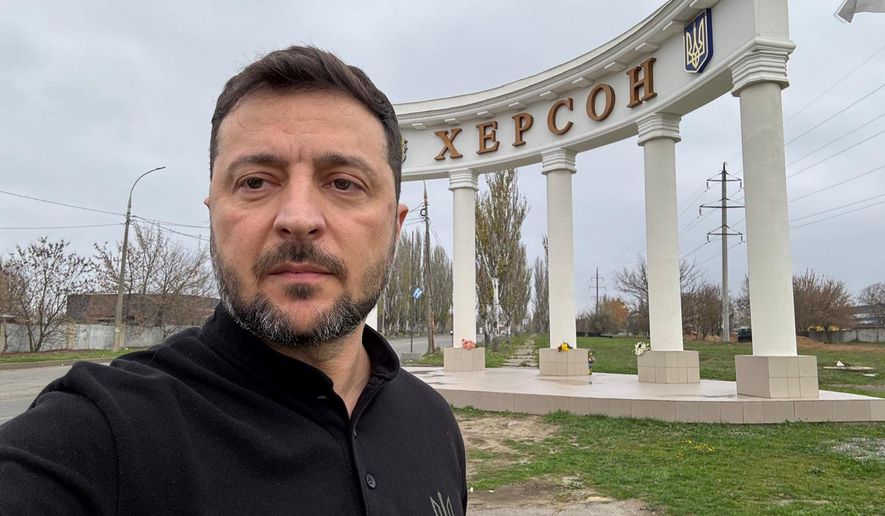KYIV, Ukraine — Ukraine on Wednesday suspended a top official in President Volodymyr Zelenskyy’s wartime government amid concerns about his role in a sweeping $100 million energy kickback scam that has led to charges against at least five people.
One of those facing charges served as an adviser to the now-suspended justice minister, Herman Halushchenko, who previously served as energy minister in Mr. Zelenskyy’s government.
Another is Mr. Zelenskyy’s longtime political ally Timur Mindich, co-owner of the television studio that was instrumental in the president’s earlier career as an entertainer.
The case threatens to undermine Kyiv’s credibility with its Western partners, its anti-corruption credentials and the cohesion of Mr. Zelenskyy’s wartime leadership.
Earlier this week, the National Anti-Corruption Bureau of Ukraine and the Specialized Anti-Corruption Prosecutor’s Office disclosed details of their investigations into the state-owned nuclear energy firm Energoatom, which allegedly forced contractors to pay kickbacks of up to 15% to avoid being blocked from contract payments or being removed from supplier rosters.
An estimated $100 million in illicit funds were laundered via a Kyiv-based “back office” reportedly controlled by Mr. Mindich, who is said to have since left the country.
The scheme draws on the legal and regulatory fragility introduced under martial law that fostered expedited procurement and weakened oversight in a sector already stressed by Russia’s sustained attacks on Ukraine’s energy infrastructure.
A Reuters report summarized the mechanism: “The contractors were forced to pay the kickbacks … to avoid blocking payments for services rendered … or to avoid losing their status as suppliers.”
Mr. Mindich is accused of steering the network of influence to extract and launder funds.
Investigators from the Specialized Anti-Corruption Prosecutor’s Office said Mr. Mindich “exercised control over the accumulation, distribution and legalization of funds of criminal origin in the energy sector” and “profited from his privileged relations with the president.”
Mr. Halushchenko, who served as energy minister until July and has since served as justice minister, has had his home and offices searched by detectives from the National Anti-Corruption Bureau of Ukraine.
He was suspended from his post by Prime Minister Yulia Svyrydenko.
Writing for Liga.net, Ukrainian political analyst Volodymyr Fesenko described the unfolding investigation as “a time-bomb” for Mr. Zelenskyy.
Mr. Zelenskyy, who was elected in part on an anti-corruption platform, finds himself ensnared in a scandal that directly affects his inner circle as well as a particularly sensitive sector.
Ukraine’s Western backers are closely watching reforms and institutional integrity in Kyiv.
Mr. Zelenskyy’s July attempt to place the National Anti-Corruption Bureau of Ukraine and the Specialized Anti-Corruption Prosecutor’s Office under government supervision had provoked mass protests and raised alarm in Brussels.
The state’s energy sector has represented a strategic front in the war for years, as frequent Russian missile and drone strikes have targeted Ukraine’s grid and nuclear infrastructure.
A corruption scandal in this area thus carries outsized symbolic resonance. Officials in Kyiv emphasize that the investigation is not only about illicit enrichment but also about institutional accountability in wartime.
Meanwhile, Western interlocutors have privately expressed concern that unless Kyiv follows through with visible prosecutions, its struggle for European Union candidate status and further assistance may be jeopardized.
The European Parliament’s statement issued at the 17th meeting of the EU-Ukraine Parliamentary Association Committee on Tuesday reaffirmed that “bringing those responsible for crimes of aggression to justice” and restoring Ukrainian institutions were central to the partnership.
In July, Ukraine’s parliament revoked reforms that had weakened the National Anti-Corruption Bureau of Ukraine and the Specialized Anti-Corruption Prosecutor’s Office after public protests.
This reversal was a signal that the leadership in Brussels and Washington closely monitors Ukraine’s anti-corruption orientation.




Please read our comment policy before commenting.